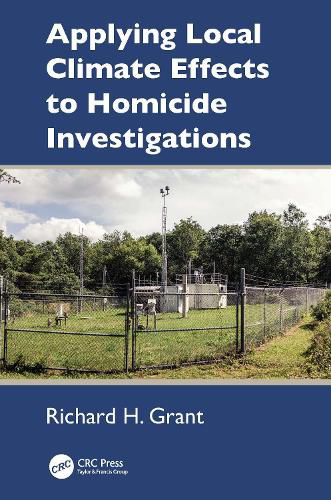Readings Newsletter
Become a Readings Member to make your shopping experience even easier.
Sign in or sign up for free!
You’re not far away from qualifying for FREE standard shipping within Australia
You’ve qualified for FREE standard shipping within Australia
The cart is loading…






Applying Local Climate Effects to Homicide Investigation presents the concepts behind using local climate and weather records to enhance understanding of criminal cases. While sources of such local climate and weather information varies by country and regions, weather conditions are typically measured at airports or grassy areas as part of a national, regional, or state-wide networks using many different instruments.
The information derived from such instruments and weather reporting services and agencies can inform and impact investigations, especially in the case of natural death or homicide cases. The determination of post-mortem interval (PMI) in homicide cases is often based on entomological or anthropological evidence in combination with local climate estimations. Determining the local climate conditions typically requires knowledge of the environmental conditions where the body is found and the conditions where the measurement record was made. Most people recognize that cities are hotter than the surrounding countryside and that lake and coastal shorelines are cooler than fields: all of these comprise local climates. The local climate where a corpse is discovered usually differs from where temperature and humidity measurements are made. Consequently, many investigators and forensic pathologists do not realize the influence that such local temperatures and humidity can have on post-mortem interval determinations.
The book focuses on local climate conditions associated with the determination of post-mortem interval (PMI) and gives concepts behind adjusting climate information for local climates at the corpse. In addition, the book will present guidelines for crime scene investigators and lawyers to determine whether or not expert consultation is needed, and whether or not on-site measurements are needed. Most importantly, this book presents tools (data sources and modeling approaches) to guide forensic climatologists conducting forensic climatology work. It offers a basic, working understanding of the influence of the local environment on the local climate for forensic entomologists, forensic anthropologists, crime scene investigators, and lawyers. Numerous case studies are included throughout to show approaches, illustration decision points, and provide an understanding of the various impacts of regional and micro-climates upon decedents and their remains.
$9.00 standard shipping within Australia
FREE standard shipping within Australia for orders over $100.00
Express & International shipping calculated at checkout
Applying Local Climate Effects to Homicide Investigation presents the concepts behind using local climate and weather records to enhance understanding of criminal cases. While sources of such local climate and weather information varies by country and regions, weather conditions are typically measured at airports or grassy areas as part of a national, regional, or state-wide networks using many different instruments.
The information derived from such instruments and weather reporting services and agencies can inform and impact investigations, especially in the case of natural death or homicide cases. The determination of post-mortem interval (PMI) in homicide cases is often based on entomological or anthropological evidence in combination with local climate estimations. Determining the local climate conditions typically requires knowledge of the environmental conditions where the body is found and the conditions where the measurement record was made. Most people recognize that cities are hotter than the surrounding countryside and that lake and coastal shorelines are cooler than fields: all of these comprise local climates. The local climate where a corpse is discovered usually differs from where temperature and humidity measurements are made. Consequently, many investigators and forensic pathologists do not realize the influence that such local temperatures and humidity can have on post-mortem interval determinations.
The book focuses on local climate conditions associated with the determination of post-mortem interval (PMI) and gives concepts behind adjusting climate information for local climates at the corpse. In addition, the book will present guidelines for crime scene investigators and lawyers to determine whether or not expert consultation is needed, and whether or not on-site measurements are needed. Most importantly, this book presents tools (data sources and modeling approaches) to guide forensic climatologists conducting forensic climatology work. It offers a basic, working understanding of the influence of the local environment on the local climate for forensic entomologists, forensic anthropologists, crime scene investigators, and lawyers. Numerous case studies are included throughout to show approaches, illustration decision points, and provide an understanding of the various impacts of regional and micro-climates upon decedents and their remains.